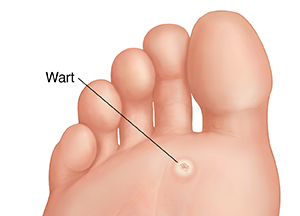Stepping Towards Clarity: Warts on Feet
Warts on the feet are a common condition that can cause discomfort and inconvenience. Understanding and addressing this condition is important for individuals seeking relief and effective treatment. In this comprehensive guide, we will provide you with a detailed overview of warts on feet, including their causes, symptoms, and treatment options.
Warts

What are warts?
Warts on feet, also known as plantar warts, are non-cancerous growths caused by the human papillomavirus (HPV). They commonly occur on the soles of the feet and can be identified by their rough, grainy appearance. Unlike calluses or corns, warts have small black dots, which are clotted blood vessels.
Causes and risk factors
Warts on feet are highly contagious and can be acquired through direct contact with the virus. Walking barefoot in public places, such as swimming pools or locker rooms, increases the risk of exposure. Individuals with weakened immune systems, such as those with diabetes or HIV/AIDS, are more susceptible to developing warts.
Types of warts on feet
Several types of warts can affect the feet, including common warts, flat warts, and mosaic warts. Common warts are typically small, raised bumps with a rough surface. Flat warts are smoother and may appear in clusters. Mosaic warts are larger and can form a patch of warts.
Symptoms and signs
Individuals with warts on their feet may experience symptoms such as pain or tenderness while walking or standing. The presence of small, fleshy bumps with a rough texture is a common sign of foot warts. These bumps may have tiny black dots, which are the clotted blood vessels mentioned earlier.
Diagnosing warts on feet
If you suspect you have warts on your feet, it is important to seek medical advice for a proper diagnosis. Healthcare professionals can typically diagnose warts based on their appearance. In some cases, a biopsy may be performed to confirm the diagnosis.
Treatment Options
Self-care and home remedies
While there are various self-care and home remedies available for managing warts on feet, it is important to note that these may not always be effective. Some practical tips include keeping the affected area clean and dry, avoiding picking or scratching the warts, and wearing comfortable shoes that minimize pressure on the warts.
Medical treatments
Professional medical treatments for warts on feet include cryotherapy, laser therapy, and surgical removal. Cryotherapy involves freezing the warts with liquid nitrogen, while laser therapy uses a focused beam of light to destroy the warts. Surgical removal may be considered for larger or stubborn warts.
Prevention strategies
Preventing warts on feet involves taking proactive measures to reduce the risk of exposure. This includes wearing flip-flops or sandals in public areas, keeping your feet clean and dry, and avoiding direct contact with warts or surfaces that may harbor the virus. Regularly inspecting your feet for any signs of warts is also recommended.
FAQs
Are warts on the feet contagious?
Yes, warts on feet are highly contagious. The human papillomavirus (HPV) that causes warts can be easily transmitted through direct contact with an infected person or contaminated surfaces. It is important to take precautions to prevent the spread of the infection, such as avoiding sharing personal items and maintaining good hygiene practices.
Can warts on feet disappear on their own?
While some warts on feet may resolve on their own over time, it is not guaranteed. The duration and natural progression of warts on feet can vary from person to person. Factors such as the individual’s immune system, the type of wart, and the treatment received can influence the outcome. It is advisable to seek appropriate treatment to speed up the resolution of warts and minimize the risk of spreading the infection.
Are over-the-counter treatments effective?
Over-the-counter (OTC) treatments can be effective in treating warts on feet for some individuals. These treatments usually contain ingredients such as salicylic acid or freezing agents that help to destroy the wart tissue. However, the effectiveness of OTC treatments may vary depending on the individual and the type of wart. It is important to carefully follow the instructions provided and consult a healthcare professional if the wart persists or worsens.
When should I seek medical attention?
It is recommended to seek medical attention for warts on feet in the following situations:
If the wart causes significant pain or discomfort
If the wart is growing rapidly or changing in appearance
If the wart is bleeding or oozing
If you have a weakened immune system
If self-treatment has been unsuccessful
A healthcare professional can provide an appropriate diagnosis and recommend suitable treatment options based on your specific situation.
Can warts on feet reoccur?
Yes, warts on feet can reoccur even after successful treatment. This is because the human papillomavirus (HPV) can remain dormant in the skin even after the visible wart has been removed. To minimize the chances of recurrence, it is important to follow prevention strategies such as maintaining good foot hygiene, avoiding direct contact with warts, and wearing protective footwear in public areas.
Are there any natural remedies for warts on feet?
While various natural remedies are claimed to treat warts on feet, their effectiveness is not scientifically proven. Some popular natural remedies include applying duct tape, using tea tree oil, or rubbing garlic on the wart. It is important to note that these remedies may not work for everyone and could potentially cause skin irritation or allergic reactions. It is advisable to consult with a healthcare professional before attempting any natural remedies.
Conclusion
Warts on feet can be a bothersome condition, but with proper understanding and treatment, relief is possible. In this comprehensive guide, we have provided an overview of warts on feet, including their causes, symptoms, and treatment options. Remember to consult a healthcare professional for an accurate diagnosis and appropriate treatment. By taking proactive measures to prevent warts and seeking timely care, you can step towards clarity and find relief from this common foot condition.




